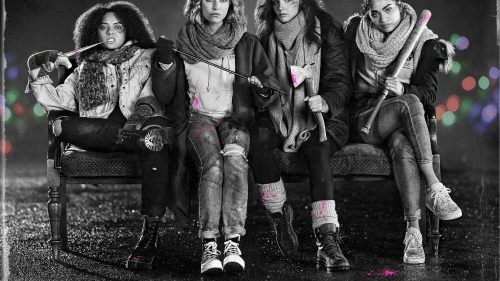THE LAZARUS EFFECT Movie Review: Dead Isn’t Better
Olivia Wilde is so good in The Lazarus Effect, you’ll wish she’d used her star power to push for an R rating - and, for that matter, a better movie. The latest addition to super-producer Jason Blum’s glossy, cheaply made genre movie factory (which includes Insidious, Sinister and The Purge), The Lazarus Effect is the kind of wide-release horror film that tries to have it both ways: it’s safe enough to ensure its PG-13 rating and, thus, bring in the swarms of teenyboppers necessary for huge opening weekend figures, and it’s just nasty and bleak enough to win over the least discerning of horror aficionados. By coasting in that tedious middle ground, The Lazarus Effect flat-lines before Wilde’s ever able to help it transcend beyond the Ouija spectrum of Blum’s filmography.
But, damn, is she dynamite in it. The lithe, quietly expressive actress plays half of a boyfriend/girlfriend scientist duo, Zoe and Frank (Mark Duplass), who are working on a gooey white serum that’s meant to resurrect the dead; the plan, as they’re justifying it, is to give doctors and surgeons a few extra moments to bring someone back after they’ve checked out, to give people “the second chance they deserve.” Assisting the scientists are three younger student helpers, all of whom attend the nameless religious institution where the experiments take place. There’s the one-note stoner dude Clay (American Horror Story regular Evan Peters), the soft-spoken and Zoe-obsessed Niko (former Community star Donald Glover, a.k.a. rapper Childish Gambino) and the perennially tank-top-clad aspiring documentarian Eva (Sarah Bolger, from ABC’s Once Upon a Time). Together they manage to revive a deceased pooch, but just as the reanimated dog starts exhibiting signs of being a bit off-center, the university’s president shuts down the scientists’ four-year-long study due to “religious reasons.” (Religious interference being one of the film’s many half-baked and ultimately throwaway plot points.)
Their video footage gets wiped clean and the campus fuzz raids their lab. But you can’t keep a good living dead dog down. Hoping to repeat their success, they break into the facility to resurrect Canine No. 2 on camera, but a freak accident sends Zoe to the pearly gates and leads a weeping Frank to go against his team’s better judgment and inject Zoe’s fried corpse with their magical concoction. It works, but it also taps into the childhood trauma that’d been giving her horrific nightmares as an adult, an episode in which a young Zoe watched neighbors in her apartment building burn alive. And once the bodies start dropping, Frank begins wishing he hadn’t played God.
The Lazarus Effect’s director, David Gelb, meanwhile, merely plays the part of a horror filmmaker. Coming off of the critically beloved and altogether upbeat 2011 documentary Jiro Dreams of Sushi, Gelb doesn’t have the visual flair or ingenuity needed to oversee a genre movie as blandly by-the-book as this knockoff hybrid of Flatliners and Pet Sematary. There’s no distinctive personality to The Lazarus Effect - it’s countless other Hollywood horror movies resuscitated into a hodgepodge of routine imagery. He relies on two overly familiar tactics to elicit lazy jumps from the audience: the old “obscure what’s behind a character via close-up and then pan back to show there’s someone standing behind them,” and more sudden blackouts than a neighborhood’s worth of unpaid electric bills. The lights shut off, characters audibly voice their concerns, and then flashing bulbs reveal Zombie Zoe’s whereabouts long enough to frighten any viewers who’ve either never seen a horror movie before or just don’t care enough to demand more from the genre.
At a scant 83 minutes, The Lazarus Effect mercifully doesn’t overstay its welcome, yet, due to that short running time, its third act feels rushed, as if Zombie Zoe has a bus to catch. Her kills are uninspired and toothless, beholden to the PG-13 rating and muted by the fact that none of her victims are more than one-dimensional archetypes. It’s a shame, too, because Wilde’s performance suggests she’d have gone for broke if given the chance. With blacked-out eyes and a devilish stare, the underrated actress does a great job of injecting real menace and a faint amount of helpless regret into the homicidal and slightly inhuman character’s presence. But the script constantly betrays Wilde’s skills, making her convey subtextual pain and remorse that are never earned and hardly logical. Zoe’s tragic side never goes deeper than Gelb’s dull attempts at hallucinogenic flashbacks. There’s only so much Wilde can do with a recurring burning hallway motif that makes Barton Fink feel like The Shining.
At best, The Lazarus Effect is proof that Wilde would be killer in a strongly made Bride of Frankenstein remake. She definitely deserves more than this Deadly Friend wannabe.



